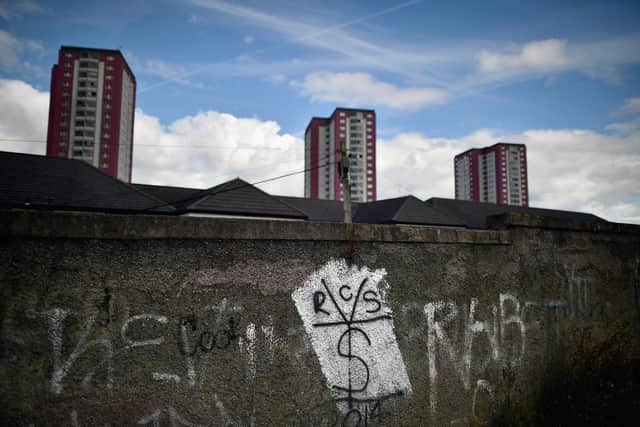Death rate in Scotland's most deprived areas nearly double that of affluent communities
The pandemic has exacerbated the long-standing problem, with the Covid-19 death rate around 2.4 times higher in the poorest areas.
The research by the National Records of Scotland (NRS) found that as time has gone on, the imbalance between the most and least deprived has grown, in part because risk factors such as diabetes, obesity, and lung disease are more common in worse-off areas.
Advertisement
Hide AdAdvertisement
Hide AdIn the early stages of the pandemic, the figure stood at around 2.1.
The inequality gap was laid bare as daily Covid cases rose by more than 2,000 and a further seven coronavirus patients died.
Another 6,029 positive coronavirus cases were recorded in the 24 hours to Tuesday.
In total, 45,512 new tests were carried out and of these, 14.9 per cent were positive.
Julie Ramsay, a vital events statistician at NRS, explained: “Since the first registered Covid-19 death in March 2020, NRS has reported on over 10,500 such deaths.


"The pandemic has had a devastating impact on the lives of people across Scotland. But it is clear from our statistics that this impact has varied over time and across the country.
“We know that there have been two clear waves so far. Also, death rates in our most deprived communities were 2.4 times as high as those in our least deprived communities. This is a higher gap than the general mortality rate.”
The new NRS report into Scotland’s population found the death rate from all causes in the most deprived areas of Scotland stood at 1.9 times the rate in the nation’s least deprived areas.
Advertisement
Hide AdAdvertisement
Hide AdThe research also highlighted a “huge gap” in healthy life expectancy across the country.
Men born in the poorest areas can expect around 25 fewer years in good health compared to those in affluent parts of Scotland, with the gap exceeding 21 years among women.
The research found people in the most deprived areas were 18 times more likely to suffer a drug-related death, with the alcohol-specific death rate 4.3 times that in the least deprived areas.
Pete Whitehouse, director of statistical services at NRS, said: “Our report on Scotland’s population in 2020 shows that the death rate from all causes in the most deprived areas of Scotland is nearly double the death rate of people in our least deprived areas.
“The difference in death rates is higher for drug-related deaths, alcohol-specific deaths, suicides, and Covid-19.
“People in more deprived areas can also expect far fewer years in good health. There is a 20-plus year gap in healthy life expectancy between people in the least and most deprived areas.”
A total of 585 people were in hospital with recently confirmed Covid-19 as of Tuesday, with 54 people in intensive care.
To date, 4,106,408 people have received their first dose of the coronavirus vaccination, while 3,680,761 have received their second dose.
Advertisement
Hide AdAdvertisement
Hide AdThe spike in Covid cases came after a record 7,113 positive tests were reported on Sunday. However, it is understood that figure may be artificially high as a larger proportion than usual of the specimens were processed more than 48 hours before due to backlogs and delays in the testing system.
Despite the rising case numbers, First Minister Nicola Sturgeon said last week that a “circuit breaker” was not currently being considered.
She urged businesses and individuals to continue complying with basic mitigations such as wearing face coverings and regularly washing hands.
It comes as the NRS published guidance ahead of next year’s Scottish census, which reveals that transgender individuals can self-identify without need for a gender recognition certificate (GRC).
The guidance, published on the census website, states: “If you are transgender the answer you give can be different from what is on your birth certificate. You do not need a GRC.
“If you are non-binary or you are not sure how to answer, you could use the sex registered on your official documents, such as your passport.”
Angus Robertson, Cabinet secretary for the constitution, said: “The publication of the guidance for the sex question provides welcome clarity for people filling in the census and supports participation by enabling all people across Scotland to complete the census next year.”
A message from the editor:
Thank you for reading this article. We're more reliant on your support than ever as the shift in consumer habits brought about by coronavirus impacts our advertisers. If you haven't already, please consider supporting our trusted, fact-checked journalism by taking out a digital subscription.
Comments
Want to join the conversation? Please or to comment on this article.
